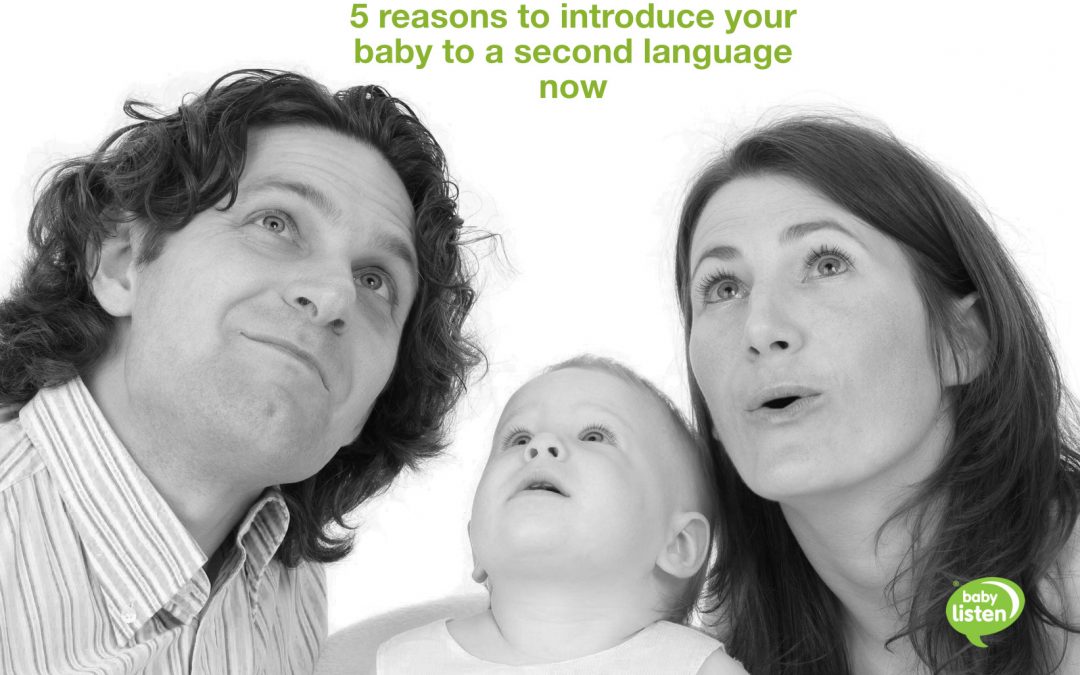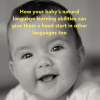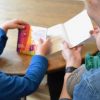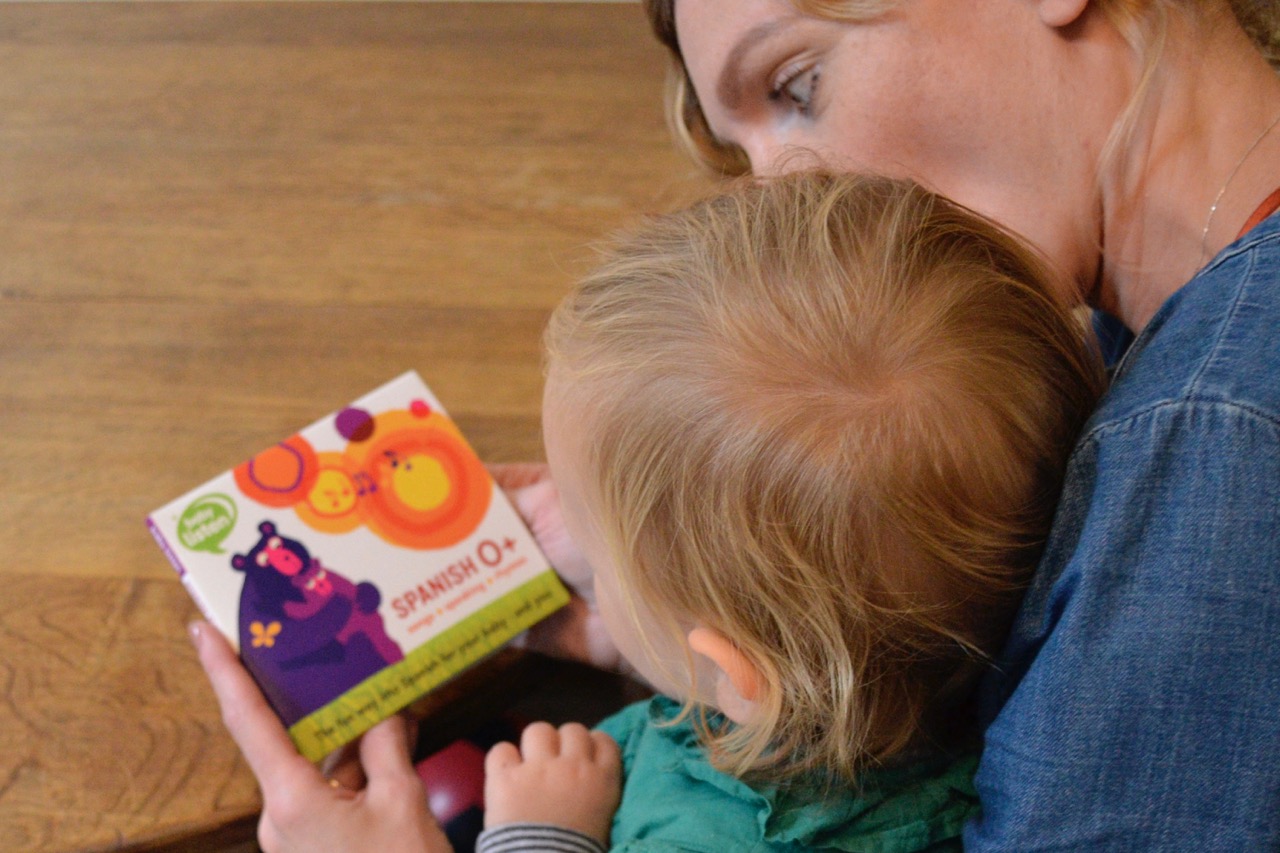The early weeks and months of parenthood – they’re some of the most exhilarating – and exhausting – times that most people go through in their lives.
And yet there are moments when the nappy’s changed, the nap’s out of the way and you’re able to be with your baby.
A key time for new parents
At these times, you’re beginning to find your voice as a parent – telling your child what you’re going to do together later on in the day, singing those first songs, mentally dusting off the rhymes you learned as a child.
You can be sure that your baby is listening to your every word… or rather your every sound (more about that below).
So as well as sharing your first language, could you be sharing a second?
More and more parents are realising that the earlier you begin with a second language, the more natural it is for your child to pick it up.
Yet more parents think about it, wonder whether they should take it further… but then time passes and – oops – they haven’t done it.
The reality is that the best time to start bringing another language into your child’s life is today – and here are some reasons why.
5 reasons why you should introduce a new language to your baby:
Reason 1: Babies’ early window of opportunity for language sounds
While everyone knows that small children are good at picking up languages, what’s less well-known is that babies have an extra window of opportunity for language sounds during the first eight to ten months of life.
At this time, babies’ super-sharp ears can tell apart all of the language sounds of all of the world’s languages – they really are specialists in language sounds and could learn any language they happen to be born into.
But towards the end of their first year – as they specialise in the sounds they hear used around them – this amazing ability fades.
So introducing a new language in those early months takes advantage of your baby’s natural abilities at the optimum time.
Reason 2: It benefits your baby
In terms of language, it’s the sounds that interest babies early on – sounds and combinations of sounds – which will help them do one of the things they most want: to communicate.
Babies spend their first months listening and analysing the sounds they hear, and then practise making those sounds they’ve decided are useful (the ones they hear other people using) – in the form of babbling.
So, using the language you want to introduce in a way that involves human interaction – such as in songs and rhymes that you share together – is a great way to introduce babies to a new range of sounds.
And as we explore in this post, exposing babies to new language sounds during the early months is something which can have long-lasting benefits.
Reason 3: Babies love it
Babies adore being with their parents or care-givers, so more time doing things together means more fun!
Singing songs together – particularly with a physical element such as clapping hands – or sharing finger-counting rhymes with the people they love the most: all this is something babies love… and want more and more of.
Reason 4: It benefits parents
Many parents feel they didn’t succeed with languages themselves, and that’s something they’d like do differently with their child.
Does that describe you?
It’s not too late!
Starting a language with your child through singing and rhymes taps into the way we all learned our first language – mastering the sounds first, with lots of experimenting and not caring who hears us getting it wrong.
It’s not the way adults typically learn a language: we usually start on words and phrases, with the meaning front and centre. In that way of doing it, the sounds can sometimes be a bit of an afterthought. Yet making the sounds of a new language – comfortably and in the right order – is what makes many adults’ knees start to tremble.
If that more traditional method didn’t work for you, give this more natural approach a try. And if you have learned languages successfully in the past, then you’ll know how satisfying it can be!
Reason 5: It can (and should) be simple, fun and affordable
There are so many online courses, DVD series, apps and books out there, not to mention trawling through YouTube to find something suitable and melodic.. Phew, it’s easy to end up feeling that it’s all a bit much.
Slow down – it’s simpler than that.
If you use songs and rhymes really designed for babies – ones that are clear and with the right mood and tempo – you’ll see that it’s easy and fun to give your child an early start in a new language.
Here’s how it works:
1. You sing along to the songs with your baby and share the rhymes. Sometimes you do it all yourself – seeing and hearing you singing and speaking makes it seem important for your baby, so they pay attention. At other times you can just listen together, so you both get to hear the native-speaker pronunciation.
2. You learn the songs and rhymes naturally as you share them together.
3. You repeat and enjoy them as often as you and your baby want. Babies and small children love repetition – they get satisfaction and pleasure out of each time they repeat something or hear it repeated.
This process of enjoying songs and rhymes is so natural – and as you listen and sing in another language you and your little one become familiar with the sounds and how to make them.
Show that it’s easy to switch
Songs and rhymes in a second language can also be easily mixed in with ones in your own language – that way you’ll be modelling to your child that it’s easy and natural to switch between languages.
Some of that ease may then rub off on you… so why not give it a go? You could be surprised at how much you enjoy it!
If you’re choosing Spanish – a note on the content of our album:
At Baby Listen we know from long experience that parents need (very, very much) to enjoy the children’s audio they’re listening to!
So we’ve gone the extra mile to make sure that everything we produce is top quality – with engaging voices, real instruments and beautiful arrangements – so as to appeal to parents as well as their children.
More from the Baby Listen blog:
Songs we love: Hickory Dickory Dock – in Spanish
What is Hickory Dickory Dock in Spanish? That’s a tough question! Maybe it’s best first to ask what it means... So... what does Hickory Dickory Dock mean? Well, the phrase might have its origins in the words Hevera,...
Songs we love: A la nanita nana – with lyrics in Spanish and English
A la nanita nana: is this the most beautiful lullaby in Spanish? A la nanita nana is probably the most famous Spanish lullaby song, loved by parents, babies and children throughout the Spanish-speaking world. It has a...
Map out a future with other languages
In the early weeks and months of your baby’s life, even though they may not produce anything that’s recogniseable as speech, they are listening carefully to the sounds other people make, analysing them and putting them into categories on a developing mental sound map.

The fun way into
Spanish for your
baby - and you
Enter your email here and then check your inbox for your offer code - sign up now:






